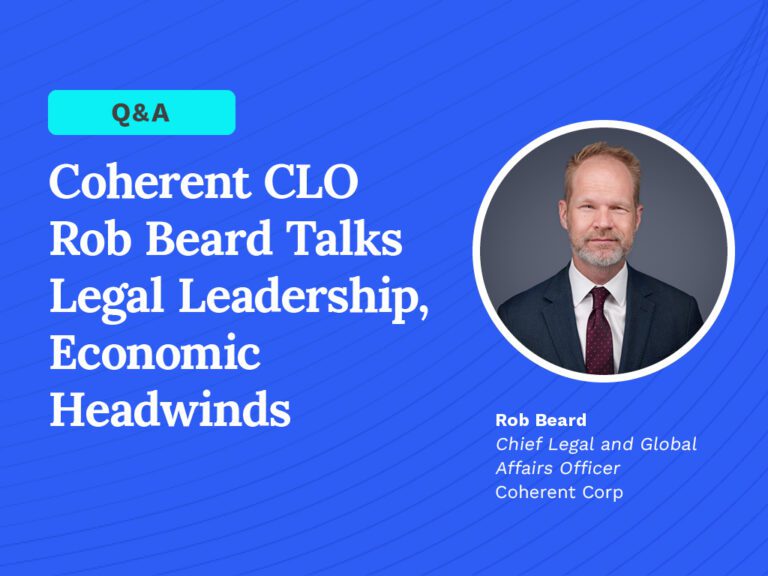Coherent CLO Rob Beard Talks Legal Leadership, Economic Headwinds
June 23, 2025

Rob Beard is the Chief Legal and Global Affairs Officer at the materials, networking, and lasers company Coherent Corp. He has more than 20 years of senior international experience across business, policy, and legal. Before joining Coherent, Beard was the Chief Legal and Global Affairs Officer at Mastercard, and spent nearly a decade at semiconductor company Micron Technology.
Published in Today’s General Counsel, July/August 2025
In this exclusive interview, Coherent Chief Legal and Global Affairs Officer Rob Beard talks about legal leadership and navigating the uncertainty surrounding the tariff situation. Part two of our interview about M&A and his advice for young lawyers can be found here.
You’ve worked in a variety of different environments, from a law firm to a major credit card company to a semiconductor manufacturer. What is the common thread in how you’ve approached legal leadership across such different industries?
Rob Beard: Yeah, that’s a good question. I think for me, what we’re trying to do, no matter where we are, is trying to be sort of a partner to the business. What I’m always trying to do with the legal team is to create an organization that shapes, enables, and drives strategy at the company. So a team that’s able to shape strategy, a team that’s able to enable strategy to help the business achieve its strategic goals. Then it has to drive the strategy, which for me is different than enabling. Driving is sort of evangelizing the strategy.
It’s really helping lead the company through whatever happens and sort of relying on that strategy to take you through. And I think a legal organization has a unique ability to do all of the things. The legal team can really help the company stay grounded.
Obviously, we’re hearing a lot of talk about economic headwinds, persistent inflation, tariffs, supply chain instability, all this geopolitical risk. What do you think legal teams can do to navigate that legal and operational uncertainty in this environment?
Rob Beard: A good legal organization is led by someone or led by people who have the ability to see around the corners and understand what’s happening in the world, anticipate the company’s needs, and get the company ahead of what’s going on.
I’ll take tariffs for example. If you are a seller, when you’re selling to customers right now, Incoterms [International Commerce Terms] really matter, right? People didn’t think about much about Incoterms until a few months ago. They weren’t spoken about in CEO staff meetings or board meetings much. But whether you’re delivering something DDP [Delivered Duty Paid] or DAP [Delivered at Place] really does matter now.
So being able to help the company understand that if you agree to a DDP term, this is what it means down the line. And if our customer wants a DDP term today, what are they really trying to achieve? And is there a way for us to give a DDP term without giving up this, without sort of accepting the risk of tariffs, for example?
And so one of the things we talked about here was what does DDP actually mean? Does it mean our customers are expecting us to bear the cost of the tariff? Does it really mean that our customers are looking for somebody to be the employer of record and deal with all of that stuff? Could we pass the cost of the tariff onto them—take a DDP term and really turn it into something different, which is a modified DDP where it’s DDP, but they’re actually willing to or contractually obligated to bear the cost impact of a new tariff beyond the baseline or something.
Another big one, again on tariffs, is on the supply side. We started thinking about what an environment could look like where tariffs become an important policy tool. What is our standard? What do we pay in terms of tariffs on the supply side and what’s our standard form look like? How often do we adhere to the standard form? Doing that work ahead of time, so that when things start to happen, you’ve already done the work, you have a playbook you can go out and execute.
On a related note, in today’s environment where uncertainty is really high and resources are tight, how do you see the legal department contributing to broader business objectives while still fulfilling its core risk mitigation role? And what role do data and analytics play in striking that balance?
Rob Beard: I guess if you don’t mind, I’ll very nicely quibble with you on one point there. I don’t really view legal as having a risk mitigation role. I expect my lawyers or the people that work in our organization to be business leaders first. People who are business leaders who look at the world through a different lens. We have a lens that we are given either at birth, or it’s ingrained in us by going through law school and all of our training. We look at the world a certain way—we bring certain experience to every business objective.
And for me, it’s not like I’m not trying to necessarily mitigate or eliminate risk. What I want to do is I want to help the business understand how to achieve its objective in the smartest way possible. That’s the goal for me—operating the business in a sustainable way, in a long-term sort of shareholder value driving sort of way.
When you build an in-house legal team, you’re trying to provide that legal advice or that business advice or the legal lens to the company. And there are different ways you can do that. One way is you could hire some people internally who interface with the business and then have good outside counsel relationships, run to the outside counsel, get advice from them and bring it back to the company. That’s one way to do it. The other way is you sort of build up expertise within your own team so that you can do more and you never really need to go out. But I don’t think very many companies have the luxury of having such a great strong and healthy legal team that they never have to go to outside counsel. When I was chief legal officer of Mastercard, I had over a thousand people in the organization and we still relied on outside counsel all the time.
The challenge when you go to outside counsel is you go to outside counsel on a question, you get an answer, you provide that advice back to the business, but your team and your company does not grow at all, right? You get advice, you execute on the advice and you repeat over and over again. Whereas if you’re able to take the knowledge of doing work and institutionalize it somehow in some way, you’re able to create the knowledge base within the company.
You then grow your team, your team’s knowledge and experience and ability to execute. And then if you’re really good, you can scale that in the business. And the more repeatable things are, you can give that legal advice and then turn that legal advice into a set of operating procedures that the business can operate within where they never have to talk to legal at all, right? I think that is how you can turn a legal team from a group of people that can go get advice and bring it back to the business, to a group of people that can really help the business operate in that long-term sustainable way that drives long-term shareholder value.
Read part two of our interview about M&A and Beard’s advice for young lawyers.
Must read intelligence for general counsel
Subscribe to the Daily Updates newsletter to be at the forefront of best practices and the latest legal news.
Daily Updates
Sign up for our free daily newsletter for the latest news and business legal developments.




